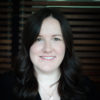Russian President Vladimir Putin, who warned that countries who interfere with his invasion of Ukraine will face “consequences you have never seen,” recently ordered his military to put its nuclear forces in a “special regime of combat duty.” It is not immediately clear what is driving Putin’s actions, says Julie Garey, an assistant teaching professor of political science who specializes in international relations and U.S. foreign policy. “There are many reasons Russia could have done this, and its intention to actually use these weapons—versus threatening their use—cannot yet be inferred,” she says.
The White House does not believe Americans have reason to be concerned about nuclear war. Rather, “this is really a pattern that we’ve seen from President Putin through the course of this conflict, which is manufacturing threats that don’t exist in order to justify further aggression,” press secretary Jen Psaki said in a television interview.
Still, the mere threat of nuclear weapons is “unnerving,” says Garey, whose research interests include alliance and coalition warfare, U.S. military strategy, and American foreign policy and national security.
Garey is author of The US Role in NATO’s Survival After the Cold War, which examines the role of NATO in post-Cold War military engagements to explain the alliance’s persistence over the past two decades. News@Northeastern sat down with her to get her take on Russia’s nuclear arsenal.
Her comments were edited for brevity and clarity.




